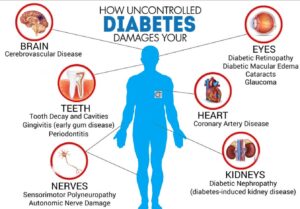CARDIOVASCULAR COMPLICATIONS OF DIABETES
Macrovascular Complications of diabetes are primarily diseases of the coronary arteries, peripheral arteries, and cerebrovasculature. Early macrovascular disease is associated with an atherosclerotic plaque in the vasculature supplying blood to the heart, brain, limbs, and other organs. Late stages of the macrovascular disease involve complete obstruction of these vessels, which can increase the risks of myocardial infarction (MI), stroke, claudication, and gangrene. Cardiovascular disease (CVD) is the major cause of morbidity and mortality in patients with diabetes.
Cardiovascular Complications – Like obesity, physical inactivity age and hypertension with dyslipidemia, diabetes is a major risk factor for cardiovascular disease, independently CAD, in turn, is many reasons for mortality, and the world over CAD in diabetic patients is more severe, more complex and results in higher complications

Risk Factors for Coronary Artery Disease in
· Risk of CAD increase as glucose metabolism increases
· 14 – 16% decrease occurs with every 1% decrease in HbA1C
· Often Hypertension, obesity and dyslipidemia is associated with diabetes causing the risk to increase many folds.
Blood pressure: Both systolic and diastolic raise in BP increases the risk of CAD.
A 10 mm of Hg the rise in BP increases the risk of CAD by 12% and A decreases of 5.6 mm of Hg of systolic blood pressure reduces CAD mortality by 18%.
Dyslipidaemia: High levels of triglycerides, VLDL, and LDL with low HDL cholesterols define diabetic dyslipidemia even a slight increase in LOL causing oxidation and accumulation in the blood vessel.
LDL – C is a progressive and continuous CV risk factor in people with diabetes lowering LDL – C reduces the risk of CV events. Treatment of diabetic dyslipidemia can improve CV outcomes.
Albuminuria – Albuminuria is an independent risk factor for CV events as well as heart failure studies of macroalbuminuria have established if beyond doubt a creatinine level of 1.24 mmol/L has a 22% risk of MI.
Metabolic syndrome as a risk factor:
Metabolic syndrome compresses abdominal obesity, Insulin Resistance, Hypertension, and Dyslipidaemia.
Cardiovascular events and cardiovascular mortality increase in metabolic syndrome
C – Reactive protein
CRP is a marker for inflammation AS inflammation plays a role in all stages of atherosclerosis. It acts as an indicator of further coronary events.
Clinical Features:
CV risk in diabetic patients is four times more than non-diabetics. It can occur Myocardial Ischemia, Autonomic neuropathy, Fatigue, Confusion, Tiredness, Oedema, Haemoptysis, Nausea, Vomiting, Arrhythmias, Cough, Dyspnoea, Silent MI
Screening and Investigations:
ECG – Painless ST-segment depression LV hypertrophy technetium perfusion scintigraphy
– Ambulatory ECG monitoring for silent ischemia Echocardiography – shows diastolic dysfunction & LV wall motion abnormalities.
– Check of microalbuminuria
CT Angiography – Coronary calcium scores increased/
Carotid USG – to rule out carotid atherosclerosis
Management:
Optimal medical management of diabetic drugs with coronary drugs are required.
Coronary artery bypass is more beneficial in diabetic compared to percutaneous coronary intervention as the chances of restenosis is more in diabetes.
Apart from cardiovascular complications, there are many other microvascular and macrovascular complications that occur due to diabetes. Medigrad.com has covered that all in an extensive 1 Year Fellowship program in Diabetology. The courses cover all major topics including Introduction & Epidemiology of Diabetes, Classification & Types of Diabetes, Pathophysiology & Normal Physiology, Diagnosis of Diabetes & complications, Non-Pharmacological Management & Pharmacological Management, and covering the elaborated topics of Macrovascular and microvascular complications. It is a perfect program for MBBS Doctors who are looking for blended courses after MBBS completion. It is a blended program delivered by medigrad.com for young doctors who are looking for online courses post MBBS to be done along with their clinical practice or while studying for post-graduation. Fellowship in Diabetology program will help to gain in-depth knowledge about diabetes and will let them enhance clinical skills by this blended learning program.
